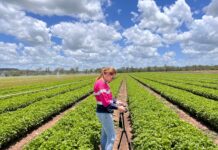
More than 20 students studying under the umbrella of CQUniversity gathered at the Botanic Gardens this week to experience First Nation knowledge and practice as it relates to Indigenous land management.
Under the guidance of local Indigenous man Leslie Lowe from TECKnology Indigenous Corporation, the group explored waterway habitat, plant life and native animals and insects that contributed key linkages to sustainability.
Leslie said he was delighted to work in a capacity as a mentor. “Traditional methods associated with sustainable land management have been tried and proven for generations and I find the sharing of this information particularly beneficial,” he said.
Native bees in the spotlight
While examining a native bee hive at the Botanic Gardens, the questions from students were wide ranging from the traditional benefits and uses of products from native bees to more complex questions relating to marketing these products worldwide and the issues of intellectual property ownership.
Students looked at water quality at the Gardens and the possibility of using native plants and vegetation to improve the health of the water.
Event organiser and CQUniversity Office of Social Innovation program manager Ashley Clarke explained the workshop would help students to build their capacity in several key areas including leadership, problem solving, empathy and teamwork.
The students cut into their university holiday break to undertake the workshop which centred around the theme of “How First Nation knowledge and practice around agriculture, sustainable farming and land management might interface with new technology to maintain and regenerate local ecosystems”.

Students travel for studies
Ashley said the students came from Melbourne, Brisbane, Noosa, Rockhampton, Gladstone and Bundaberg to learn about Indigenous land management.
“The Botanic Gardens experience along with discussions involving other First Nation stakeholders including Gidarjil Corporation has provided inspiration for the students and identified issues and challenges,” she said.
“The final phase is to develop ideas and strategies to address those challenges currently facing our ecosystems.
“The university is providing input from leading academics who will draw on their experience in agricultural production in places like Papua New Guinea as well as expertise in new technology and innovation.”
The event concludes today with a “pitch” where participants will present their ideas in groups to invited guests from community and industry.
The event has been made possible thanks to support from Bundaberg Brewed Drinks, Bundaberg Regional Council, Burnett Mary Regional Group, Gidarjil Development Corporation, Greensill Farming Group, Queensland Computers, Queensland Rail and TECKnology Indigenous Corporation.







